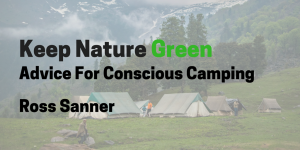Wilderness areas may be largely untouched, but prime hiking and camping spots are still public land, with all of the traffic that comes with it. The resurgence of outdoor activities as cheap and easy getaways has brought an influx of people into nature. However, this has also led to some of these environments becoming damaged as a result of human contact.
If you are an avid hiker or camper, you likely know that your impact on the environment matters. Strive to monitor your own activities and leave no trace for your next trip into the wild.
Stick to the trail.
This is one of the most important pieces of advice, and is applicable no matter the scope of your trip. Trails exist for a reason, and venturing off of one can not only lead to some unfortunate contact with poison ivy—it can damage the environment as well. Follow the blazes, walk single file, and tread lightly on less frequently used trails. You’ll preserve plant life, soil integrity, and are less likely to wind up with deer ticks or similar pests attached to you.
Find a good surface to camp.
Not all campsites are created equally. Many parks offer specific spots or cleared areas to camp, which should be observed whenever possible. If you’re really out in the wilderness and are in need of a site, stick as close to the trail as possible and avoid clearing an area to create a campsite. Additionally, be aware of potential hazards around you, such as overhanging branches, poisonous plants, and animal dens. Minimizing your impact should also extend to making fires; build them small and in established fire rings.
Take your trash with you.
If you can pack it in your backpack and your car, you can afford to carry it back with you and dispose of it properly. The maxim of “leave no trace” is very much relevant—even a small amount of litter can harm wildlife, not to mention mar the beauty of whatever environment you are traveling in. Manage the waste that you accumulate, and you’ll be contributing to keeping the environment pristine. For human waste, it’s a different story—if no restroom facilities are available, thoroughly bury all waste away from any campsites and bodies of water.
Respect others.
Really, being green is all about respecting other people, and their right to enjoy the untouched spectacle of nature. However, when you’re in a campsite that may be shared with many others, this respect becomes even more important. Stay quiet if you have others staying near you, and yield to faster hikers on the trail. Traveling in small groups is recommended to minimize impact as well.
Give space to animals.
Nature, like many other things, should be appreciated at a distance. Try not to disturb the animals you may encounter in your travels; while a grizzly bear may not be something you would want to approach to begin with, steer clear of others as well. Even more harmless animals such as deer can still be dangerous if cornered or threatened. Additionally, be sure to secure your food when camping; if animals are able to steal it, they may grow dependent on travelers in the area for sustenance, which is ultimately detrimental.

